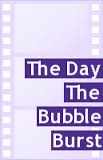
THE DAY THE BUBBLE BURST
US, 1981, 142 minutes, Colour.
Richard Crenna, Robert Vaughan, Robert Hays, Frank Converse, Blanche Baker, Audra Lindley, Bill Macy, David Ogden Stiers.
Directed by Joseph Hardy.
The Day the Bubble Burst is a look at the crash of Wall Street in 1929. it is based on a best-seller, has the technique of focusing on a number of stories and blending them together so that audiences can understand tile repercussions of the crash. The film is designed as telemovie, for the widest possible audience - and, at the end, has an endorsement that the film is useful for historical study for students.
The film was directed by Joseph Hardy, a director of many telemovies including Great Expectations with Michael York and James Mason. There is a solid cast including Richard Crenna, Robert Vaughan, David Ogden Stiers. There are a lot of excellent character actors who fill out the background of America in the '20s. (An interesting comparison would be Oliver Stone's 1987 look at the Stock Exchange in the '80s, Wall Street.)
1. Audience interest in the 1929 crash? Americana? A re-creation of history? Situations, characters, the build-tip to the crash and its consequences?
2. The film as a telemovie, its scope, period, range of stories and characters? The atmosphere of the time? Re-creation of period? Musical score?
3. The structure and the stories: the human element in the build-up to the crash, ordinary people and their investments, greedy people at all levels trying to exploit the market? The significance of the Jazz Age chorus? The build-up to the day the bubble burst? The information given at the end about the various characters and the consequences of the crash? (The evil being punished, the good surviving?)
4. The stories commenting on each other, American society, capitalism, the various theories for the crash?
5. The Michigan story: audiences identifying with the situations and characters? The bank, the staff decision about the money, the embezzlement and the risks, the information coming in from New York, the tensions amongst the various members of the staff? Leroy and his nervousness, the build-up to the confrontation, his telling the truth to the bank owner? The owner and his sense of integrity? His son emerging as
one of the embezzlers? The reputation of the bank, the investments, the closing of the bank and the staff reaction? The population?
6. The Michigan story of Jolan and her parents, their needs, the bequest of $400, Mr Goldenberger and his matchmaking, Barker and the postman, the unions, tile discussion about capitalism and socialism, mediation? Steve, the courting of Jolan, the interviews about his prospects? The wedding, the money, anxiety? The parents and their losses? The aftermath and the comment about Jolan and Steve and their life?
7. Jesse Livermore and his ruthlessness, a market bear, his office and his staff, his womanising, his wife and her alcoholism, their clashes and fights, his sense of the market move, his reliance on instinct and timing, the professor and the interviews to bear up his interpretation, relationship with the journalists, his success? The aftermath and his downfall?
8. The contrast with Durant and his being a market bull, his friends, their success, deals, callous attitudes, their professor to back up their opinions, failure?
9. Richard Whitney and his presence on the Stock Exchange, his extensive speculations, reliance on George and J. P. Morgan's for support, the crisis at the Exchange, his being in charge, J. P. Morgan and the rescue, the decision not to rescue the Exchange? The decision to close the gallery? His failure? The subsequent information about his career and its failure?
10. Gregory and the Jazz Age, his father, socialist background, in love with Frances, nights out, marrying her, their life-style, Frances' family and their Wasp background? At work, J. P. Morgan's, encounters with Whitney, his discussions with Frances about the Exchange, conscience? Their becoming New York socialites?
11. The Blacks: the father and his speculations, the mother and her ignorance, Gloria and her life-style, collecting information, the play? Her visit to Germany and being on the set of The Blue Angel? The comments about Marlene Dietrich and the Nazis, about Emile Jannings, the singing of 'Falling in Love Again'? The plight of the Jews, her return? The collapse of the market and their lifestyle? The father's despair, the struggle with her father to stop him killing himself?
12. The jazz, the chorus, its being inserted throughout the film? Symbol of the period?
13. The consequences of the build-up to the Stock Exchange? The effect on the American economy in the '30s?
14. Themes of capitalism, American money, the law, manipulation, greed and control?